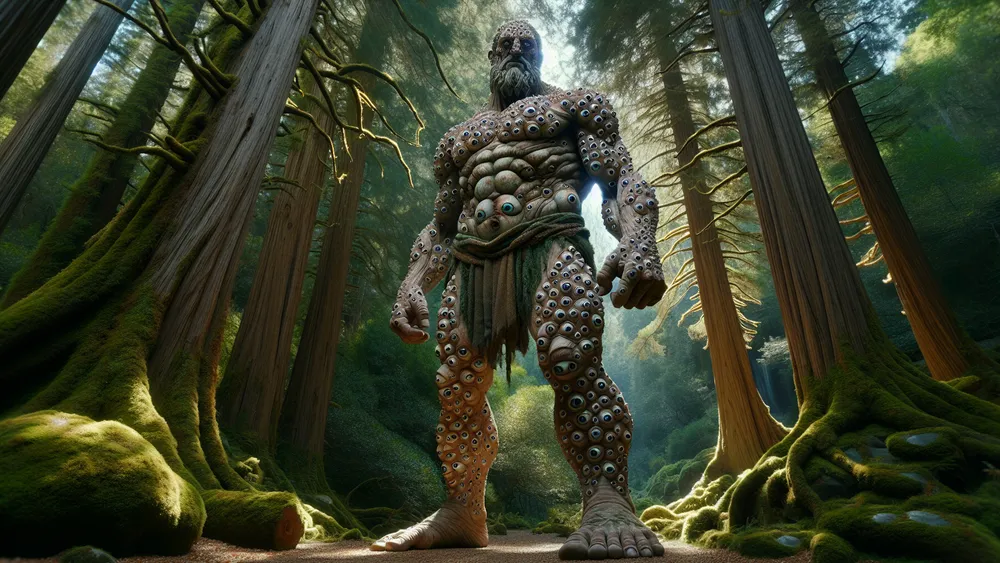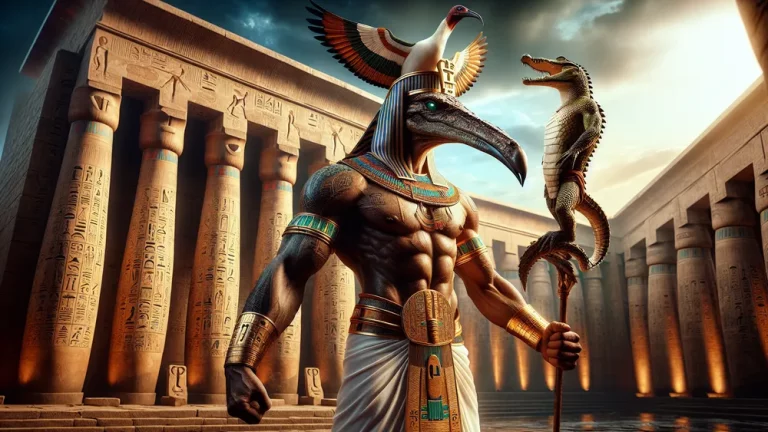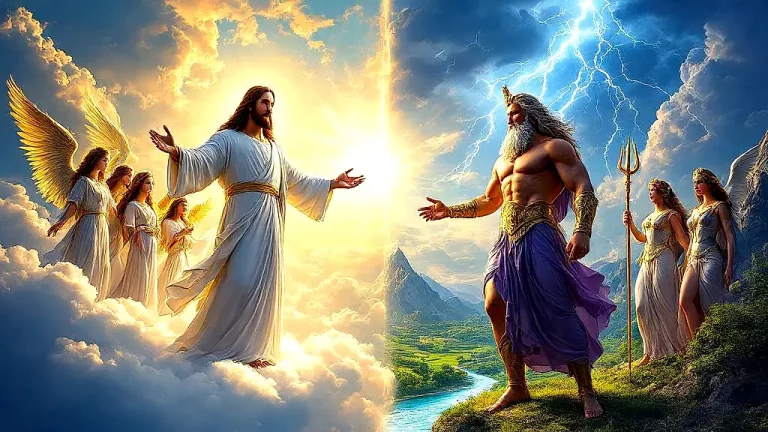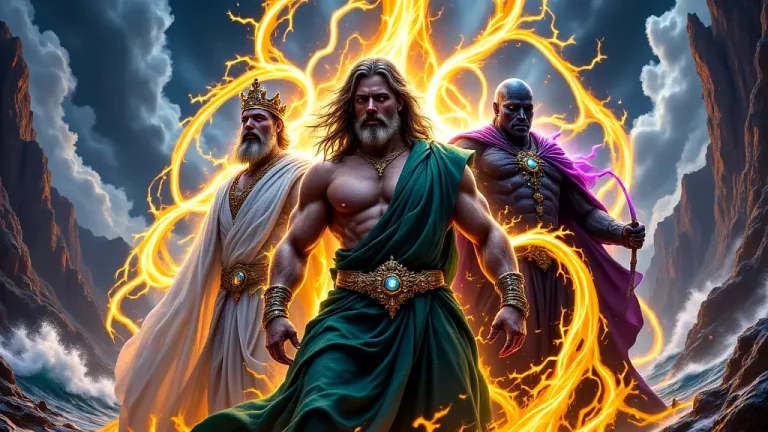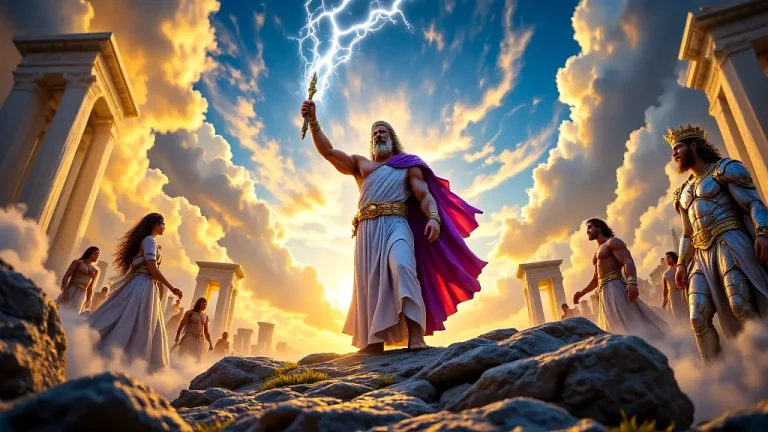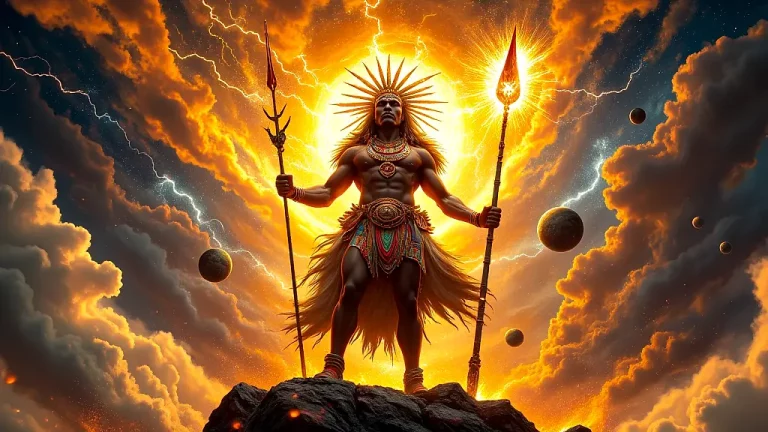Argus: The Hundred-Eyed Giant Watcher In Greek Mythology
In the big and detailed world of Greek mythology, Argus Panoptes, the man with a hundred eyes, stands out. Think of a guard so watchful he could see all things, like a modern system with loads of cameras. Argus’s story is about duty, loyalty, and sadness, all part of the bigger story of the gods and heroes in old Greece.
Key Points:
- Argus Panoptes, often called Argus, is a character from Greek mythology known for his hundred eyes, symbolizing watchfulness and omnipresence.
- His parents were usually said to be Arestor, but some tales also mention Gaia, the Earth, as his mother.
- Argus served as a servant and guard for Hera, the queen of the gods, his main duty was to guard Io, a priestess who caught Zeus’s attention.
- In the tale of Io and Argus, Hera turned Io into a white cow to keep her from Zeus, and instructed Argus to guard her.
- Hermes, under Zeus’s orders, put Argus to sleep and killed him, rescuing Io from his watchful eyes.
- After Argus’s death, Hera honored him by placing his hundred eyes on the peacock’s tail, which became her sacred bird.
- Argus’s legacy is seen in today’s culture, often symbolizing vigilance and alertness, and his name is used by tech and security companies to emphasize their all-seeing capabilities.
We will look at where Argus comes from, his family, and what all his many eyes mean. We will talk about his job as a guard, his work for Hera, and what he did in the story of Io. Plus, we will see how things ended for Argus when Hermes did something dramatic and how Hera remembered him after.
Also, we will see what his eyes mean, how he appears in art and writing, and his lasting mark on today’s world. Join us and learn about Argus, the hundred-eyed guard in Greek mythology.
Argus: Overview and Key Facts
| Key Fact | Description |
|---|---|
| Name | Argus Panoptes |
| Meaning of Name | Means “All-seeing” or “All-eyes” |
| Parents | Often said to be the son of Arestor, though some stories mention Gaia (Earth) |
| Eyes | One hundred |
| Role | Guard and servant of Hera |
| Main Job | To guard Io, a priestess of Hera |
| Famous Story | The tale about Io and Argus |
| Death | Killed by Hermes |
| Honor After Death | Hera put his eyes on the peacock’s tail, her special bird |
| What it Means | Vigilance, watchfulness, and being everywhere |
| In Culture | Often seen in old Greek art and literature |
| Today | Mentioned in different forms of today’s media, including books and movies |
The Tale of Argus
To really get why Argus is important in Greek stories, we must jump into the many stories that shape who he is. Let’s look at where he comes from, his special traits, and the big parts he played.
Where Argus Came From
Argus Panoptes, often just called Argus, is a character whose roots go deep in Greek mythology. According to many accounts, Argus is the son of Arestor, though some myths mention Gaia, the Earth, as his mother. Arestor is not very well-known, but being linked to Argus puts him in the complex web of mythological family trees.

Imagine tracing your own family history and finding out that your family includes not just people, but gods and ancient beings. This is the kind of family Argus has, making his story a very interesting part of the larger myth.
Argus’s roots are important because they connect him to the wider stories of Greek mythology, where family lines often decide a character’s role and importance. Being possibly linked to Gaia, one of the first gods, adds an ancient importance to Argus’s character. Gaia, as the Earth, is a fundamental figure in Greek myths, giving life to many gods and creatures.
This connection shows Argus’s role as a guard, as he represents the watchfulness and being everywhere that one might think of with the Earth. Knowing Argus’s roots helps us see his place in mythology and sets up his many roles and adventures.
Argus’s family ties to Greek mythology are crucial as they establish his significance in the larger mythological narratives, hint at his role as a guardian, and connect him to ancient deities like Gaia, the Earth.
Argus’s Hundred Eyes
Argus Panoptes is well-known for his hundred eyes, a feature making him a matchless watcher. Picture a building having a hundred surveillance cameras, each placed to cover every possible angle – this is like how Argus’s eyes were spread over his body. These eyes did more than just look impressive; they worked and let him stay alert without stopping. According to myth, Argus always had some of his eyes open, even while he slept, which meant he could never be caught off guard. Because of this, he was the perfect guardian for tasks needing unwavering attention. His hundred eyes represent:
- Vigilance: Always watching, some eyes were always open.
- Omnipresence: Seeing everything around him.
- Loyalty: His dedication to his jobs, especially serving Hera.
What Argus Did as a Guardian
Mostly, Argus Panoptes worked for Hera, the queen of the gods. Think of a very trusted guard who is loyal without question – this means Argus had a strong connection with Hera. His most important job under Hera’s orders was guarding Io, a priestess who Zeus liked.
To keep Io away from Zeus, Hera turned her into a white cow and told Argus to watch her. Argus, with his hundred eyes, appeared the ideal guard, keeping Io always under watch and away from Zeus. His vigilance made him very useful to Hera, who trusted him to follow her instructions without failure. Additionally, Argus was known for protecting Hera’s interests in general. He was like a loyal watchdog, always alert.
His hundred eyes let him see large areas, making it hard for anyone to avoid being seen. This made him a strong guard, able to stop any threats just by being there. His work for Hera was more than just guarding Io; he was a symbol of her power and control, showing the watchfulness and loyalty Hera expected from her followers.
Through these roles, Argus represented the qualities of an ideal guardian in Greek mythology.
The Story of Io and Argus
Think about this: Io, a beautiful priestess of Hera, grabs Zeus’s attention, the king of the gods. Zeus, known for liking many women, becomes taken with Io. To keep her safe from Zeus and hide his interest from Hera, Zeus turns Io into a white cow. However, Hera, always suspicious and watchful, sees what Zeus is doing.
To keep Io safe from Zeus, Hera tells Argus Panoptes, with his hundred eyes, to guard her. Consider a case where a jealous spouse hires the most focused private investigator to watch their partner – this is the role Argus has in this story. Argus’s job to guard Io is proof of his unmatched vigilance.
With his hundred eyes, Argus could watch Io all the time, making sure Zeus could not go near her without being seen. Hera choosing Argus for this important job means she trusted his skills and was determined to stop Zeus’s plans. Argus’s constant watch made it nearly impossible for Zeus to save Io, creating a tense standoff between Zeus and the ever-watchful guard.

This adds a lot of interest to the story, showing power and loyalty among the gods. The story of Io and Argus is not just about the gods being jealous and watchful; it also links to the bigger Greek myth stories. Io being a cow and Argus watching her are part of a larger story involving gods and people.
Io’s escape, made possible by Hermes under Zeus’s orders, and Argus being killed, show just how far gods would go to get what they want and protect what they care about. This myth also highlights themes of change, loyalty, and the results of what gods do, making it an interesting and long-lasting story in Greek myths.
The End of Argus
When the fight between Zeus and Hera got worse, the end of Argus was certain, causing a big ending planned by the gods.
Hermes Takes Down Argus
Imagine a secret agent on a special mission, tasked with stopping an unstoppable target. This is the role Hermes had when Zeus sent him to rescue Io from Argus’s eyes. Hermes, the messenger god, known for being tricky and clever, approached Argus with a plan to make him sleep. Hermes used his lyre and played soft music and told interesting stories, making Argus relax slowly.

Think about how a hypnotist puts someone into a deep sleep – this is how Hermes used his skills to appear better than Argus’s watchfulness. Once Argus was asleep, with all his hundred eyes shut, Hermes grabbed the chance to act. He quickly and decisively killed Argus, freeing Io from her constant watcher.
This act of cleverness shows Hermes as a trickster and solver of problems among the gods. By killing Argus, Hermes not only did what Zeus asked but also showed how being smart can be more powerful than being strong. This encounter shows the mix of loyalty, duty, and godly actions in Greek mythology.
Hera’s Tribute to Argus
Think about this: Hera wanted to honor Argus after he died, to remember his watchful eyes in a special way. She placed his hundred eyes on the tail of the peacock, and it became her special bird. Imagine a way to honor someone that not only remembers them but also adds part of them to something alive and colorful.

This way made sure Argus’s watchfulness and loyalty would be remembered always. The peacock’s tail, with the eyes of Argus, stands for Hera’s respect and admiration for her loyal guardian.
Here are the key parts of Hera’s tribute:
- Remembering: Argus’s eyes were put on the peacock’s tail, so that his memory would live on.
- Meaning: The eyes on the peacock’s tail mean watchfulness and vigilance, things that Argus had.
- Special Bird: The peacock became Hera’s special bird, a living way to honor Argus’s work and loyalty.
Argus’s eyes on the peacock’s tail symbolize remembrance of his watchfulness and loyalty, forming Hera’s unique tribute to her loyal guardian.
The Meaning and Impact of Argus
Argus’s story goes on even after he’s gone, affecting many parts of Greek mythology and standing for deeper ideas.
What Argus’s Eyes Represent
Imagine a modern surveillance system with cameras all around, watching every angle so nothing is missed. This is similar to what Argus’s hundred eyes did in Greek stories. Each eye meant watchfulness and being everywhere, which made Argus a very amazing guard. His eyes were not just parts of his body, but stood for his job to watch over and keep things safe.
In Greek stories, eyes often mean knowledge, awareness, and protection. Argus’s hundred eyes made these ideas bigger, making him a strong symbol of being always on the lookout and loyal. He could keep watch even if some of his eyes were closed, so he was always paying attention, a trait highly valued by the gods, especially Hera.

To understand the meaning of eyes in different cultures and stories, look at this table. It shows how different civilizations have given eyes important meanings, often about divine insight, protection, and seeing everything:
| Culture | Meaning of Eyes |
|---|---|
| Greek Mythology | Watchfulness, knowing things, protection |
| Egyptian Mythology | The Eye of Horus: protection, health, restoring |
| Hindu Mythology | The Third Eye: spiritual awakening, insights |
| Christianity | The All-Seeing Eye: divine care, knowing everything |
| Native American | Eyes in art: spiritual vision, guidance |
This table shows that the meaning of eyes goes beyond cultures, often standing for similar ideas of watchfulness and seeing everything.
Argus in Art and Stories
Think about how we see superheroes in comics and movies with their special traits and abilities shown. Similarly, Argus has intrigued people in ancient Greek art and literature. In different vase paintings and sculptures, Argus often appears with his hundred eyes, which highlights him as always watching.
A key example is how Argus is seen in the “Io and Argus” vase painting, where eyes cover his whole body, and he watches over Io. In stories like Ovid’s “Metamorphoses,” Argus’s story is told in vivid detail, that shows his loyalty and sad end.
These artworks and stories help to remember Argus’s unique traits and his important role in Greek myths.
Argus in Today’s Culture
You might see that old myths often end up in modern culture, and Argus is no different. In modern books, he is sometimes mentioned as a symbol of watching and alertness, like how his eyes watched everything.
For example, in Rick Riordan’s “Percy Jackson and the Olympians” series, Argus is a security guard at Camp Half-Blood, showing his role as a watchful guard. In movies and TV shows, characters like Argus often can see more or watch better, reflecting his legendary skills. Also, the name “Argus” is often used by tech and security companies, which emphasizes the lasting impact of his all-seeing eyes in today’s world.

Pantheon of Greek Mythological Heroes and Figures
Think about a group of characters in a popular show, each having their unique stories and qualities. The pantheon of Greek Mythological Heroes and Figures is large and varied, which includes gods, half-gods, and famous humans. These figures, from Zeus and Hera to Hercules and Perseus, all play crucial roles in Greek myths.
To find a full list of all these heroes and figures, you can look at the detailed entries that jump into their fascinating tales and their lasting impact.
FAQs
1. Who were the parents of Argus?
The parents of Argus were Arestor and Mycene.
2. What was the significance of Argus’s hundred eyes?
The significance of Argus’s hundred eyes lies in their ability to provide him with constant vigilance, as he could always keep some eyes open while others slept.
3. How did Hermes manage to slay Argus?
Hermes managed to slay Argus by lulling him to sleep with his music and then beheading him.
4. How did Hera honor Argus after his death?
Hera honored Argus after his death by placing his hundred eyes on the tail of the peacock, which became her sacred bird.

